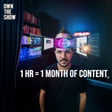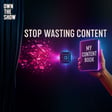Introduction to AI Micro Skills Podcast
00:00:00
Speaker
Welcome to the AI Micro Skills Podcast, where I'm curating the best lessons on AI for marketers who want to leverage what's available now.
Guest Introduction: Kuba Greissar
00:00:09
Speaker
Today, I'm talking to Kuba Greissar, who is the Content Marketing Manager at Zenpilot. Kuba, welcome to the show. Thanks, Dan. So nice to get the invite to this and really, really stoked to talk about AI with you today.
00:00:24
Speaker
So to kind of set some context for the audience, tell me a little
Kuba's Background and Journey into Marketing
00:00:27
Speaker
bit about how you got into content marketing specifically and what you're doing at Zenpilot. Sure. So my background is primarily as a writer. The first things that I did that led me to this career, although I didn't know at the time, is I wanted to write novels. I took part in NaNoWriMo for those who know. But it's a novel writing challenge that takes a month to complete. I did that, I think, five times. I still got the books on my shelf.
00:00:51
Speaker
gotta hide them before my son learns to read because they're really cringe. So then I got really interested in self-development. I joined this personal training startup. Well, it's training in soft skills, right? And there I got some coaching, got some mentoring. I started writing content for them.
00:01:10
Speaker
After that, my first big job was as a one-person content army at a software company called SDXNEXT, software development consulting company, I should say. There, I did everything. Blogs, email, website copy, sales presentations, you name it, I wrote it, and kind of scaled from there.
00:01:29
Speaker
I was lucky that the investment in
AI's Impact on Small Marketing Teams
00:01:31
Speaker
marketing at SDX was quite big. So I got my first person kind of reporting to me, even though that was my first real job. I got my first person within like three months. And within, I think it was four or five years, I scaled to 10 people.
00:01:45
Speaker
Yeah, I really learned a lot throughout that journey. Over time, as I was managing the team, project management became quite important. And I fell in love with ClickUp, the project management tool. I think a lot of people have heard about it by now. Back then, it was tiny. It was just the beginning of ClickUp. I think they were in like year one or year two, because that was 2018, I believe.
00:02:09
Speaker
Anyway, I wrote to ClickUp asking them to make a case study out of us, which they did. Along the way, I met Zenpilot, which is the number one ClickUp consultancy right now, and actually the first company to become a certified ClickUp consultant. And we've been on top of that game ever since. And I say we because I ended up joining Zenpilot and focusing on creating great content for them ever since.
00:02:36
Speaker
definitely a smaller team there and I'm getting to do more stuff directly, which also led me to leveraging AI a lot more because when you're a one person, two person team, you can get away not using these tools to make a bigger impact right now.
Transforming Podcasts into Blog Posts with AI
00:02:56
Speaker
one of my predictions for the year on AI that big companies and small companies will be taking swings at AI, but it'll be the small scrappy teams that actually figure out how to best use it. Some big teams are going to make some big investments, so they're going to have some big flops or some disappointing results, I think. Just because that's just what big companies do. They make big investments, they don't properly implement, and then they don't do small little tests to iterate and get their way there. So
00:03:24
Speaker
You have to tell me like, how did you, you've been using AI to like make your team of two feel like a team of 20, but how did you get into touring, like using it specifically to get blog posts out of podcasts?
00:03:36
Speaker
Right, so to clarify, right now I'm an individual contributor at Zenpilot and I've got Jeff Seifer, our productivity professor, kind of working hand in hand with him. He's out of marketing right now. We've both been using AI and both has been, you're talking podcasts into blogs. I'm doing a lot of that. I'm going to talk a lot about that. Jeff, what he's doing is he's also recording YouTube videos and creating blogs
Challenges with Podcast Content Conversion
00:03:58
Speaker
based on that. And I really love his prompts for that. So you should check that out on the Zenpilot YouTube and the Zenpilot blog.
00:04:05
Speaker
Within that realm, the problem that I was happy to have is that as I was joining Zenpilot, there's this really active podcast and a podcast with a long history called Agency Journey that Gray McKenzie has been hosting in previous seasons. Also, the co-founder Andrew Dimpsky was involved in hosting a whole treasure trove of shows. Regular episodes were coming out as I was joining and as I was
00:04:33
Speaker
getting up to speed at Zenpilot. So the problem I was faced with is, how do I take these really good conversations full of insights with a really focused audience? I mean, I say really focused. I certainly can get more focused, right? But Agency Journey, Gray has managed to get some of the biggest names in the agency space there sharing their
Comparing AI Tools: Claude vs. ChatGPT
00:04:53
Speaker
insights. How do I turn that into...
00:04:56
Speaker
content that is easy enough to produce for a small team, but also makes for good reading. And it's very hard to strike that balance. I've experimented in a few ways with this. I don't think I am entirely done experimenting. But some of the things that I've worked were heavily based on using not just chat GPT, but Claude. I realized, as I was looking at previous episodes of your show, that you often ask about chat GPT first.
00:05:22
Speaker
do let me know how much I can talk about Claude versus Chad. Yeah, I never talk about Claude. Honestly, I'm just not interested in Claude at all. Why not? Why not? You have to tell me why I should be because I'm just like I'm just not interested in it because it just seems like they're behind. I'm probably sure they have some nuances that are better.
00:05:39
Speaker
And because chat GPTs release custom GPTs and it's becoming multi modal where I can use it to do images and code and formats everything. Well, I've, I think I have an account with Claude. I tried it once and then just like, whatever seems like chat GPT to me. So I just stayed with chat GPT.
00:05:59
Speaker
If you'll allow me, I'll try to make a case for Claude then. Here we go. So I would say, I mean, I've used both and then my first impressions of Claude were that it gets you a lot further on the first prompt.
00:06:14
Speaker
Like I mentioned, I'm a writer by trade, so I have what I would like to call a strongly developed taste when it comes to writing. And the default chat GPT voice, first of all, people have got their radars really tuned to it right now. They can recognize it from a mile away if you don't do a lot of custom prompting to change that voice.
00:06:36
Speaker
And also, it's really verbose, uses a lot of big words unnecessarily. I'm just not a fan, right? And I know that you can go in the direction of customizing it, tweaking it, sure. With Claude, though, my first impression was, wow, I can give it simple, short instructions. And at the time, that was true. It can take a whole podcast transcript, which was really important for me.
00:06:58
Speaker
And it turns it into reasonably quality writing. Writing of a reasonable quality, I would say. The voice is more informal. It uses more direct, simple language. It knew how to weave in quotes in there. I did have a bit of a tough time getting it to use quotes, direct quotes from the transcript.
00:07:20
Speaker
But not at the time I was using YouTube transcript files, right? So there's no punctuation to speak about, right? So it looked funny where there was like this perfect grammar and then the quotation marks start and it's this YouTube kind of unformatted raw text. But that's relatively easy to fix.
00:07:42
Speaker
Still, everything around it, the structure of the blog post, the fact that it did spit out full blog post of 1,500 words at a time, that drew me to Claude initially. Interesting. I will say, right now, because of the playing... Chat GPT can only spit out, I don't know, it seems like it hovers around 700, 800 words at a time.
00:08:01
Speaker
Yeah. So every time I'm asked to do longer blog posts, I found I'm like, okay, well, I just have to break the blog post down into chunks into sections and then ask it for that section at a time. And you're right. It does throw out words that are just like, dude, no one uses the word Delve. And it's like fascinated with that word or in conclusion, you're like, Oh my gosh, nobody writes like this. Stop.
00:08:21
Speaker
Exactly. And Claw gets formulaic too, but it was not super grating. A person could get away. It could just be a relatively inexperienced writer that falls into certain kind of patterns. It doesn't sound like a machine so much.
00:08:38
Speaker
I know that as this discipline develops, you're going to want to get into custom GPTs, full-on assistance. And you're not going to interface with the AI itself so much. But I will say, give Cloud a shot if you haven't yet. Give it a full podcast transcript.
00:08:56
Speaker
It even gets as simple as write a blog post based on this, you know, and see how much further it gets you to a reasonable blog post. And then with custom prompting, it gets even further
Creating Long-Form Content with AI
00:09:07
Speaker
in there. I gave it simple instructions like use storytelling, use a slightly informal style, write it for the perspective of the host, use a lot of direct quotes, and just, you know, the prompt was kind of to the effect of what I just said, plus Claude, it gave me good results.
00:09:23
Speaker
plus chat GPT, it needs more guidance than that. So yeah, I, sorry, I wanted to get into that. Uh, cause I am a big Claude fan and proponent right now. Well, I mean, you're winning me over. I'm like, man, maybe that's why I've been writing short blog posts for chat GPT, but it's like, eh, they're just okay. They're okay. Yeah. Yeah. But because I'm not a writer, I like multimedia. I like, I mean, I like writing. I write a lot of LinkedIn posts. Um, but.
00:09:49
Speaker
I don't like writing long form content. So when I found out I could use AI to write the long form content for me, and it was reasonably good, I was like, good enough. My taste in it were so, I don't know, I hated writing enough that I just was like, nah, it's good enough. C plus is good enough for me. But if a plot can get me to B plus, I'm like, well, I know a lot of people who...
00:10:14
Speaker
I know a lot of people who can write long form content well, but not a lot of people who enjoy it. Those two groups, they don't always overlap. I think my greatest strength as a writer has more to do with me just being a better teacher than it actually is with writing. I'm not a great writer, but I know how to teach and I know how to break complex topics down into small chunks. Yeah.
00:10:37
Speaker
And that helps because obviously a lot of blog posts is education. And so since I can get better educate, but obviously if you read some of my blog posts that I've written personally, like you will find many problems. Like a writer will be like, this is horrible content, but I'm like, yeah, but it ranks number one and it's really good at teaching people things.
Benefits of Repurposing Podcast Content
00:10:55
Speaker
So exactly. Okay. So where do we go from here?
00:10:59
Speaker
I would like to know, what are you finding are the key benefits of turning your podcast into blog content? Because I remember even at Sweetfish, we were doing a lot of blogging for podcasts, people would publish it and then it would just go unnoticed. How are you using it to its full effect?
00:11:14
Speaker
That's great. I would say one of the benefits, of course, is you get a fair shot at SEO. It depends on the structure of your show. Some people have an SEO-first approach where it's like the guest gets informed from the get-go that we'll be focusing on this topic and the topic as well, SEO research, and you basically want to hit the keyword. Other shows, and this is the case that I've got with Agency Journey here, is more of a pick your brain kind of thing.
00:11:43
Speaker
within one episode of agency journey that's like thirty to fifty minutes let's say you might go into like three big topics right so then it's really it's not easy to take that and turn and kind of match it to an SEO keyword right so one thing that you can so one benefit is that you know.
00:12:03
Speaker
On the one hand, yeah, you don't go so deep into one topic that might be matched to an SEO keyword. But for three, you've got some content that you can repurpose. So with AI, with the benefit of scale, previously, it was not feasible to take one single podcast transcript and work on it so long that you turn it into three separate blog posts, each focusing on a different angle on a different SEO keyword. Now, that is becoming much more possible. So trying to stick to the question,
00:12:32
Speaker
One of the big benefits is that at least you give yourself that SEO shot based on that podcast transcript. You don't have to stick to very brief show notes. You don't have to stick to very brief bullet points, but you can actually say, okay.
00:12:44
Speaker
Take everything that person said on audience growth. Within that 15-minute podcast, there might have been a 15-minute segment. That's a lot of content. You take that, extract that, and turn that into a blog post. I wanted to highlight one tactic that I heard about but haven't tried myself yet is, once you have
00:13:04
Speaker
20 episodes and four of the guests, let's say, talk about audience growth, you might experiment with taking, you know, kind of grouping it together. And then you've got quite a longer piece of content, just an audience growth. And once you start that grouping process, I think that can take you much further. But I think you would have to re interview me in like six months for me to report back on that kind of clustering strategy. So that's one second benefit is,
00:13:29
Speaker
We're turning our podcast content into a lot of vertical short form content. So shorts, right? It's the age of vertical shorts. And it's just much more useful for us when we post something on, let's say, LinkedIn is even a good example. These are going out right now on my profile via Agora Pulse automated, really recommended. There's this first comment underneath, you know, go here to watch the full episode.
00:13:56
Speaker
You could link to YouTube, you could link to Spotify, but in terms of conversion, you're kind of stopping it in its tracks, right? If you've got an associated blog post, then at least they land on your site, they can grab the cookie, and they've got all sorts of further points of conversion from there. With Zenpilot, they can book a call, they can get a free download, we've got these banners and each piece of content that can kind of get them into our system and actually drive pipeline.
00:14:21
Speaker
And again, if you're a small team, you might be tempted to just say, okay, link to the YouTube video is good enough. And certainly that would have been true pre-AI. Right now, you don't really have an excuse not to have something to link to, some way of getting them on your site from that social media piece of content.
00:14:40
Speaker
Yup. So those two, chance at ranking on SEO, vertical short videos, and having something to link back to your blog post. Yeah. Is there anything else? You do get a chance to comment more on what was said during the show. I'm sure you must have experienced that as a host. You finish recording and you're like, I wish I said that. I wish I alluded to these additional resources. If you go deep enough, if you spend enough time on it, you can say, the guest here, Cuba mentions this
00:15:08
Speaker
tool. And here, by the way, here's my guide on using that tool, right? So you can kind of expand on it in the more advertisements for your thing, right? Or at least you can cross link other content right on a blog more easily than you can in a podcast. So I might be able to say like, like, I'm going to do this, for example, but I usually don't do this. Like, Oh, like I also talked about podcasts and podcasting and AI in an episode with Susan Diaz just a few weeks ago, you should check out that episode. That'd be kind of awkward to plug mid podcast,
Ideal Blog Post Structures and Tools
00:15:34
Speaker
right? I mean, unless it's contextually relevant, but in a blog post,
00:15:37
Speaker
That's normal and fair game. Yeah. And actually, one more comes to mind. If you are doing shorts, then I think the way I envisioned the perfect blog post based on a podcast episode, and again, with AI, this becomes feasible even for smaller teams, is that it breaks the discussion into logical sections, whether you're going, I'm going to summarize the whole podcast, or I'm going to summarize this one particular thread in a podcast, let's say whole podcast for now. We've got these clear sections.
00:16:05
Speaker
The text, I personally would make heavily based on direct quotes. And when you prompt well enough, you can get direct quotes from the transcript and match them to certain topics. The chat GPT, I will say, has this over-clawed with... I've seen threads on X about this. X slash Twitter. Do we say X or Twitter on this show?
00:16:27
Speaker
Let's go with X. So I've seen it that chat GPT drops much less of the input with longer inputs right now. So they have really caught up and surpassed Claude in that respect.
00:16:44
Speaker
So the perfect blog post has these clear sections. The text is based on direct quotes, just a signal to the readers. This is not AI. This is what they actually said on the show. And to drive the point home, if you've got shorts, just embed them. And I feel like this gives somebody such a much more robust way to interact with the content of the episode. Because, I mean, it's daunting. You see a podcast episode, 43 minutes. You've got these chapters to kind of go on. But it's even better if you can scan
00:17:13
Speaker
Not the whole transcript, but a reasonable summary of it. And if something sounds interesting, boom, there's like a well edited one minute short that gives you just the absolute gist, the essential part of that.
00:17:25
Speaker
of that part of the episode. I think that would be kind of the holy grail here.
Tools for Podcast Transcription
00:17:29
Speaker
Can you walk me through the typical process for turning a podcast episode into a blog post? Sure. Okay. So I've picked up a few things here that have saved me a lot of time and in some cases money. So when I've got a fresh podcast episode, I work with a freelancer to get them edited. The first thing I do is I take the audio file and I plug it into a tool called Revoldiv.
00:17:54
Speaker
R-E-V-O-L-D-I-V dot com. I don't know how they do it and I don't think... Sorry? It's Revoltiv? Revoltiv with a D. D-I-V are the last three letters. Man, what a name.
00:18:10
Speaker
I'm glad that the name is kind of obscure and hard to remember because I hope not a lot of people are going to use it. Right now, they just do free transcripts. If you've got a podcast out there on Apple Podcasts, for example, episodes of your show are already transcribed there.
00:18:29
Speaker
And they do it for free. There's not even, as far as I can tell, there's not even ads on the site. Although my ad blocker might be having something to say about that. That was a total gem when I found that. And of course, I found it on Reddit because that's where all the stuff. Are you still using that? I am still using that. Revolver, yeah. How are you not using something like Cast Magic already? Revolver does it. Have you heard of Cast Magic? I have, but what's the case for it, then?
00:18:52
Speaker
You upload your, I mean, you upload it. I think it sends it to Rev to transcribe it and then it goes over it with chat GPT to identify the speakers.
00:19:05
Speaker
separate them out and clean up the transcript so that the transcript has better grammar because you know when people speak like The sentences come out weird sometimes they need to be fixed So it gives it it cleans the transcript So you have a really nice transcript and then it gives you you can build in all the prompts to it So every time you upload it, it gives you like title ideas summaries questions outlines LinkedIn post all that stuff and then you can bake in whatever prompts you want or just go right to the chat and it'll deliver based on the transcript whatever you want and
00:19:36
Speaker
Okay, so I think I might have been on the receiving end of Cast Magic as a guest. About Revoliv, what I will say is, well, one advantage is that it is totally free. And second, it does most of the things that you mentioned on the transcript side. Identifying speakers, yes. Cleaning up the grammar, yes. It prompts you as you give it the file, as it's uploading, actually.
00:19:55
Speaker
to identify, to give you the names of the speaker or kind of the names of the companies involved so that if it's not sure, it's going to lean on what you gave it. So for example, my very popular name, Greitsaar, it wouldn't pick it up ever. But if I give it that name in advance, then it'll recognize that if it sounds like it might be that, then it will. That's pretty good for free because Cast Magic obviously costs some money, not a lot, but some.
00:20:21
Speaker
You're going to have to give me the link to it. I just searched for it and I couldn't find it, but I'll make sure to link to it and show notes for others because the price is free for clean transcripts. I'm like, I'm impressed. So I'm going to have to link to this one for sure.
00:20:32
Speaker
I was surprised too, and I'm sure they're not going to keep doing it forever, but for now, not just that you can give it your own file, but also if there's an existing show that you want to use a part of for any reason, and then the transcript's already there. And that is huge that you can take an existing show, which you might not always have a file of. I know there's ways to grab that, but let's not get into that. So that's step one.
Analyzing and Drafting Content with AI
00:20:52
Speaker
Once I have that transcript, I...
00:20:54
Speaker
Plug that into... Yeah, and in this case, I might use Cloud, I might use chat GPT. These days, I've been using chat GPT, experimenting more with GPT-4, because I still think it's the better thinker. I think Cloud is the better writer, but GPT-4 is the better thinker. I am talking about GPT-4 on chat GPT-plus.
00:21:13
Speaker
What I like to do, I go a little bit more under the hood. I spend a little bit more time on these, so I'm not looking for it to spit out a whole blog to work with, but I do want to have the building blocks. What is it doing for you? What do you prompt it with? I'm trying to basically emulate my thinking. What am I looking for as I analyze a podcast episode?
00:21:35
Speaker
Tell me the main topics that the guests touched upon. Tell me about the subtopics within those topics. Give me a tree of those. Within topic A, what are the three subtopics that they touched upon? What are the pieces of personal trivia that they shared about themselves that I'm going to use for flavor or as an attention grabber and the intro? What are some other questions that they may have been asked?
00:22:01
Speaker
Then I put it through the lens of the audience, right? So one of the things I've got like basically a list of like 10 things to look for within the transcript. And one of those is like, you know, from the perspective of you got that in front of you, let's read it out in front of me. If you give me a second, I should have that.
00:22:17
Speaker
Pause, pause, pause, pause, pause. Most recently, this has been the main topics that the guest covered, the subtopics within these topics that the guest covered, any interesting questions. And here's where I plug the audience. From the perspective of an agency operator, we use that a person focused on operations within an agency. It could be an agency owner or just insert your audience here. That the guest answered. A list of other questions that the guest was asked.
00:22:47
Speaker
Seems superfluous, but I just want to know that I've covered everything and if that if that there were other interesting questions in there that I catch them and some of it is pretty you know kind of common sense, but I still want to catch it is like identify the most surprising unusual or interesting things that the guest mentioned like I said personal flavor or trivia and you know typical show notes stuff is
00:23:08
Speaker
Identify any tools or resources or people to follow or even service providers that the guests recommended within the show. And one piece of tactical advice that has worked for me as well is I often use the phrase, I expect long output and I give the amount of words that I want.
00:23:27
Speaker
So to make the analysis as deep as possible, I say, I expect long output 1,500 plus words. And I don't think it hits exactly that. But that just prompts it to go a lot longer. I've noticed that these tools, there are certain things that you can say to them, like write me a blog post that make them go into this kind of long form mode, where they recognize, OK, I'm going to give you the first part of a blog post. Do you want me to continue? I like that. That gives me a lot to work with.
00:23:56
Speaker
It wasn't so easy for me to get it into that mode. And saying, I expect long output is something that has worked for me to get just a longer message out of it in response. You had main topics, subtopics, interesting questions, more like other questions asked.
00:24:17
Speaker
Yeah, these are two separate parts that weren't in your initial question list because you already have those written down. Yeah, you audience perspectives, like filming in more on that, like, what do you mean by audience perspectives? You're looking for the perspectives of the audience of like, what about their perspective?
00:24:32
Speaker
It's not super sophisticated right now in my workflow, but I just, you know, I plug it in where relevance to say, you know, what would an agency operator find interesting here? Or like, you know, I can see that you listed, I don't know, 10 different things about what they mentioned within the domain of X and you know,
00:24:50
Speaker
Sometimes I ask I asked it to rank these in order of importance for an agency owner and justify your thinking, you know, and that gives me a lot to think about in terms of this, I would say this is particularly useful if you're kind of new to your domain as a marketer. And you know, you're doing the audience research, right, but you're still getting immersed to get some additional input from chat GPT about what is typically important for your audience. So you've got kind of a leg up in terms of picking the most important
00:25:20
Speaker
or most interesting parts of, in this case, a podcast transcript to work with. I mean, you fleshing it out this way is interesting as I've not done this before. So that's why I'm asking like the little nitty gritty details. Sure. I'm going to send you what I've written down and then you fill it in with other things because I think the audience would be interested to have this. If you want to find this, go to my blog post that I'll be writing using this method in order to prove this on AIMicroskills.com. Okay.
00:25:49
Speaker
So, but this is really cool. And so what do you do next after you ask it these questions? You ask it, it provides it, you look through them. Now what? Okay. So the output from that is not a blog post, right? But it gives me at least kind of insight into what was covered on the podcast episode. And by the way, kind of the particular scenario that I'm dealing with is that this is not a podcast that I personally host. So I'm taking, you know, something that has been created by
00:26:17
Speaker
It was run by somebody else, which is why I'm also digging into the questions that were asked, etc. Now I've got this cornucopia of everything I could focus on in terms of the blog post draft. At that point, and I don't have a super specific prompt for this yet, but I do say, draft a blog post based on this.
00:26:38
Speaker
And focus on. And I pick from the topics mentioned, subtopics mentioned, I just commented natural language. This seems interesting. This seems relevant. Focus on these parts. Sometimes I might say that these other parts are not super important. For example, they promoted their product. And based on that, write the blog post.
00:26:59
Speaker
Things that I've had to do recently with GPT-4 is to re-emphasize that, because I've had it, and you might
Overcoming AI Content Creation Challenges
00:27:07
Speaker
be hitting that too if you're doing it kind of soon, that it responds with, okay, but this podcast transcript is copyrighted material that I don't, that I actually can't interact with in this way. I'm refusing to write a blog post for you.
00:27:22
Speaker
because your new guardrails on that kind of stuff. Yeah. Yeah. So I don't have a lockpick for that yet. But what has worked is re-emphasizing we own the rights. You can do this. Also kind of going into that, I believe in new territory, which I have seen the research that's saying stuff like, I believe in you. You can do this. Actually improves results, as well as I will tip $200, which I haven't yet tried. But the research is out there that it helps.
00:27:51
Speaker
I'm reading all about it on X actually, but I'm going to mention that a little bit later. So once you insist once or twice, it actually can be convinced to... I say stuff like, I work at Zimpilot, Graham McKenzie is my boss. And also because I've seen it work and I've read about it working, I do give it some kind of emotional incentive, like I will be in trouble at my job if you don't give me this blog post.
00:28:17
Speaker
shouldn't work, but does. And there's many things in AI that work that way. So once it spits out that blog post, here's where I hit kind of the biggest snag thus far. And my recommendation right now would be generate two drafts, okay, following this process in separate chats if you want, because that sometimes helps to have kind of different content. And then my approach right now is to get to work on those drafts, you know,
00:28:43
Speaker
treat them as raw material, put them together, select one section from one, another section from the other. Sometimes I'll go back to the chat. So are you drafting this in OpenAI and Claude? You're running this whole process twice? I've done that sometimes. One thing that changed for me recently is that I used to have access to Claude in a kind of unlimited fashion. I had one of those kind of beta accounts.
00:29:09
Speaker
But anyway, that's one thing that you might do is to compare outputs from two different models. Even within the same model, you can tweak the prompt somewhat, or just make it have another go at it and it will be different enough. And I've found that once you get into three drafts, four drafts, unless you give it a very different angle to work on, focus only on subtopic A and go.
00:29:34
Speaker
You're hitting diminishing returns right now, I would say. You're hitting diminishing returns and it's time to just start working on this as a regular draft.
Maintaining Authenticity in AI Content
00:29:44
Speaker
You've mentioned on this podcast, you've got a genius college student here, right? But to get it to a professional level, you need to have that senior editor come in and do some work on that draft. And it's really difficult to get chat GPT to write something that is like,
00:30:00
Speaker
Yeah, just put that into HubSpot CMS and publish. I don't think it's there yet. And I think once you're 80% happy with the draft, just polish up the rest of it yourself. And if you need to, just use it for specific things like suggest a meta description. Well, HubSpot does that within the tool right now.
00:30:17
Speaker
suggest some alternative titles, or kind of going back to the conceptual stage, what is an entirely different angle that we could take for this blog post? If we were to give it a certain style or focus on a different subtopic, then yes, chat and GPT can help brainstorm that.
00:30:35
Speaker
And it can help give you the analysis, the building blocks. It's just not that great at the actual writing yet, but it can give you a draft that eliminates the blank page here. So in practice, what I do is I generate a draft or two, edit that up, and then it goes into the publishing and publishing stage of things. And feel free to dig into more specifics here. Yeah, yeah, yeah. Are you using AI to publish any of the content? Or are you pretty much rewriting all of it?
00:31:06
Speaker
I would say right now the drafts that I'm putting out there are 60-70% AI generated, but that is because I've decided that right now the best play is to focus on quotes. So, I mean, the quotes are by definition human content.
00:31:24
Speaker
there's just other words around those quotes that are AI generated. But that just gives me a lot less to focus on in terms of fact checking, et cetera, because again, I think the biggest gold
00:31:40
Speaker
on a podcast is what the guest actually said. They said it in conversational language by default. So just expose that, build some context and transitions around it, some smart headings. And that's how we would approach this content right now. So again, 60, 70% AI generated. But of that, you might say, half is just focusing on direct quotes. And it reads like something that you would read.
00:32:06
Speaker
It's kind of journalistic a little bit, you know, or it reads more like an interview summary, right? But I feel like, I mean, personally, I like that content, because at least in the age of AI, I know that if something is in quotation marks, then that is something that a human actually said on that show. And that's something I can, you know, more or less trust if I trust the person. Everything else, everything else outside of quotation marks, you can never be sure these days.
Using TextExpander for Consistent Content
00:32:34
Speaker
How do you ensure the AR preserves the essence and tone of the original podcast? I have something here. I guess right now you would replace it with a custom GPT, right? But before custom GPTs, I was using TextExpander for this. To keep things consistent, I created...
00:32:53
Speaker
My main pain point was I was frustrated that, in this case, Claude with chat GPT has the same problem, that it didn't have context about Zenpilot. So if there was something there to be emphasized or caught from the perspective of what Zenpilot does, it didn't catch that because it didn't know my company and I was just frustrated briefing it on what Zenpilot is over and over again.
00:33:15
Speaker
What I did simply is I started a Google Doc as soon as it became possible to analyze websites with, I believe that was GPT-4 at first at that. I gave it the Zenpilot website and I said, just summarize everything from that website and also added some of our internal
00:33:32
Speaker
stuff as well Everything you know about Zenpilot into like these brief points and I have it had it as a numbered list So it came up with like 35 points, you know, who are the founders? What's the year it was established? What is the main target market? What are the main services? What are some kind of notable free downloadable resources just going deep deep deep into everything that that's to be known and
00:33:57
Speaker
And the ninja move here, if I can call it, is to use text expander. So I saved that in text expander as our kind of prompt template. And whenever I went into either Claude or chat GPT, as you can tell, I use these kind of interchangeably.
00:34:13
Speaker
I use the prompt template to begin with, ending it with. And that's important if you want to save time. Respond only with, OK, Zenpilot template loaded. Otherwise, it's going to try to do something, whatever it thinks is best with that content. But I think that's something that a lot of people have already discovered. If you've got this template, then give it something to respond with every time. So it doesn't spend so much time typing out an answer that you're not going to use anyway.
00:34:41
Speaker
So in terms of keeping it true to focus on what Zenpile offers, because we do content marketing to drive pipeline, of course.
00:34:51
Speaker
And to keep it consistent, then this prompt template really helps. And one thing that I definitely wanted to plug coming into this, if you're not using TextExpander yet, I discovered it. I thought I understood what TextExpander is. Explain it to me. TextExpander basically allows you to set up these short hands for whatever you might want to type into an input field, basically. Within a pack.
00:35:16
Speaker
I use it on Mac, is there a Windows version? I can't say from memory. I would assume yes, but I first- Is this an app where you're putting in short codes and it's just essentially pulling in what you've trained it to pull out? You put in a code and then it pulls in something you've trained a whole couple of sentences. Is that what it is?
00:35:37
Speaker
Yes, but it can do more than just a couple of sentences. So, you know, when I used to experiment a lot with like, I asked Claude for a draft based on the same transcript like five times, or I noticed that it's sometimes better to start a fresh chat with the same transcript, because otherwise it starts really leaning on the previous content and kind of repeating itself and going into more and more verbose language. It really saved me time to have the transcript itself
00:36:06
Speaker
saved as a text expander prompt, because there isn't much of a limit on how long these can be, you know, kind of the output, right? So, you know, I define these as, I think my kind of template for these was like, zp trans dan, let's say, or like danches, right? And then our conversation would pop out each time. Where it gets interesting, though, kind of,
00:36:29
Speaker
outside of the realm of AI, but this actually might get connected in the future, is you can make these company-wide. For example, let's say it's like a ZP address, and every time it outputs the address, the official operating address of the company.
00:36:47
Speaker
Well, that address recently changed. So if a change like that happens, if everybody's leaning on TextExpander, actually you don't have to communicate it that much because they'll use the same code. They'll get a different output this time around. And it's like, oh, it changed. So essentially TextExpander is a short code tool that you can use to load in all kinds of content, especially if
Advice for New AI Content Creators
00:37:08
Speaker
you're using the same prompts over and over again, then TextExpander makes it into instead of copying and pasting it from a dock where you stored the prompt, you can use TextExpander to load it in faster.
00:37:16
Speaker
Exactly. Slightly made irrelevant by custom GPTs where you could build a custom GPT with that prompt already baked in, ready to go to some degree. But I mean, if you're a heavy text expander user, you're probably using it for lots of things, prompts included, and not every prompt, even repeated prompt deserves its own custom GPT.
00:37:34
Speaker
Exactly. And then for those cases, or, you know, if there's a, you know, a particular way of giving feedback to chat GPT that you often use, like, I don't know, think deeper about this, or, you know, break it down into steps, then you might have those saved as text expander snippets as well. Snippets is what they're called. And then, that saves you time. You know, it's a small tactic, but every minute counts here sometimes. Yep.
00:38:00
Speaker
What advice would you give to somebody who's still kind of new to this and hasn't been engineering prompts as long as you have to get started writing blog posts with podcast transcripts?
00:38:10
Speaker
That's interesting because there's a lot to delve into here. I would say take it step by step and try to break down the process in your own head as well. What do you do? If you were doing this manually, what would you do step by step? And then try out each of these steps. Try to accomplish each of these steps with AI. And you will find, like I have and thousands of other people have, is that for some steps, it does a great job.
00:38:39
Speaker
For some, it might even do a better job than you would, especially if you're doing these at scale, or it would do it much faster. For some other steps, and this is a big piece of advice that I would have given myself as well in the past, is for some of the steps in this process, you have to concede.
00:38:58
Speaker
You can do it better for now, at least for now. So kind of break it down. Turning a podcast into a blog post is a long process that has a lot of moving parts. Which of these parts are you giving to AI? And then, of course, you can grab some prompts from the web. You can use custom GPTs. But I encourage everybody, especially at this early stage in the AI journey, to look under the hood, to spend some time with chat GPT itself,
00:39:25
Speaker
and to just see what works, try to pull some levers, try to experiment with various things. Now, some people listening to this might not be so creative, right? And they might not have come up with certain things by themselves. I certainly wouldn't have thought to use stuff like, it might cost me this job if you don't give me good output here, these kinds of prompts. So in terms of sources of inspiration,
00:39:50
Speaker
I have deliberately turned my X feed into basically all AI all the time, followed all the accounts, and I recommend it in terms of platforms. I've seen the AI content on LinkedIn. It's pretty good. Yours is getting better and better, of course, Dan. But in terms of deep stuff, stuff that's based on research, real papers being cited, then X is really good, actually.
00:40:17
Speaker
for this. I mean, people on the X are really excited about AI. There's whole movements almost feels like different kind of belief systems around AI being formed there. So I recommend doing some searching there. I mean, a lot of it is, you know, there's some stuff here that you kind of have to filter through. But anyway, it gives you for the less creative people, it gives you a lot of prompts to experiment with. It gives you a lot of ideas to kind of threads to pull on. And over time, I think this is what's going to happen with most of us is
00:40:47
Speaker
everybody's going to develop their own prompting style at least, or maybe custom GPTs down the line. Yep. It's one of those things where you can't go read a book about it. There's courses about it, but the courses are kind of like over the top or too niche often. So really, I find just setting aside time to experiment is probably the best thing you can do by far. And this has kind of been true for like learning anything,
Personalizing AI-Generated Content
00:41:09
Speaker
Just setting aside an hour and be like I'm gonna try to play with this I have this transcript from a podcast we did I'm just gonna fiddle with it and then I'm gonna try it again and I'm gonna try it again I'm gonna take some of these inspirate inspiration I heard from maybe this show or from a tweet thread somewhere and I'm just gonna try it out for my own opinions and then build my own You just have to take care. You have to set aside time to play. Otherwise It won't it won't work. It's not like code where it's more
00:41:35
Speaker
formulaic it really is a really subtle and weird art of a black box where you're inserting stuff into this thing called AI and then pulling it back. Yeah, it's becoming more known what works and what doesn't work like silly things like try harder. Saying telling it to try harder gets it gets different results and everyone's just trying to figure out like what, like, how can I send different information in to get stuff back? And then how do I organize that information in such a way that works, right? Developers might be doing this for about a year now.
00:42:05
Speaker
And they're still brand new to it. Why does take a deep breath work? This thing, as far as we know, doesn't breathe, right? And yet, it's one of the best prompts. Also, I would recommend if you're really just starting out with this, likely you have some existing blog posts based on podcast transcripts. Stuff that took you hours to produce.
00:42:30
Speaker
Here's one thing to try. Take that to chat GPT as input. The input window is now much longer if you're on chat GPT plus. And even for GPT 3.5, you might be able to use chunks of it and just ask it for a deep analysis of, okay, here's an existing blog post. Like tell me everything you can, you can surmise about it.
00:42:47
Speaker
You know, everything that you're noticing about it. Tell me about the style, tell me about the structure, kind of try to explain it, kind of compress it into a description of the style and use that for your prompt moving forward. It won't be perfect, right? I do that all the time. You can actually download all your LinkedIn posts, so I did that recently. All the LinkedIn posts I've written over the last three years.
00:43:09
Speaker
Yeah, it'll give it to you. It gives you like a whole packet of files and you have to go find all the one with the posts in it. I uploaded that as a CSV and I was like, hey, analyze this document. And as an expert copywriter, analyze my style, my tone, and anything else that you think you would need to know to write better as me and create a style guide for yourself that I can give you as instructions for the future.
00:43:33
Speaker
Bam. Create a custom GPT, take what it gives you, put that in the instructions, maybe even take your post and load that in the knowledge of the custom GPT and you have your own personal writer. You could do that for a company blog post or company website. You could just be like, analyze the site as an expert copywriter, analyze the style and write a style guide for yourself. Yeah, this is the thing to do. I'm not a writer, so I don't even know how to frame my own tone.
00:43:58
Speaker
because a lot of people aren't. I mean, if you're writing blog posts for your company, you probably understand these things, but I'm like a multimedia marketer, kind of writer, kind of not. So I just, it was much faster for it to write it for me.
00:44:11
Speaker
Yeah, I did that for my own writing. And even if I am a writer by trade, there are certain things that you're doing unconsciously. And it's interesting to see a deep analysis of your own writing style from somebody who has like infinite patience and somebody something that has infinite patience. So like one thing that stood out to me is that it turns out I lean a lot on self deprecating humor in my content. And I kind of
00:44:36
Speaker
you know, seeing that written, I was like, yeah, I do do that. Although I would never kind of if you were to ask me about my style up until recently, I would never say that this is one of my main, you know, the main parts of my style. But yeah, it is now I know. Yeah. So even if you're a writer, give it a shot. Have a build a writing guide for you. You can have it build a writing guide for anything where there's a consistent enough content or even a few blog posts that can go through and find a trend and then give you an analysis on that and then write exactly. Yeah.
00:45:05
Speaker
I often, just as the last part of this, I often like to ask it about the flavor. Analyze the writing style, but also be on the lookout, especially for the stuff that gives this person flavor. One of our co-founders, Gray, that I mentioned already, his thing is baseball. He makes baseball references, so catch that. For me, it's... And I'm deliberate about it. I talk a lot about bass and do metal music.
00:45:33
Speaker
Just for personal brands, this is going to help people stand out. So if you're analyzing something looking back, then you want to, you know, you want to catch that. Then you can use that for analogies and even AI content can become just much more engaging when you ask it to. And I've used that for podcast transcripts as well, you know, kind of capture what the guests mentioned. And I think this particular guest was into jigsaw puzzles.
00:45:54
Speaker
and baked that back into, in this case, it was writing LinkedIn posts for her based on the podcast, which is a whole other topic, but strongly related. I looked at the LinkedIn posts to create it for her and I was like, yeah, that's really good because it's humanized because I told it how to humanize the content more by focusing on these hobbies and special interesting things about a person that gives them flavor.
00:46:19
Speaker
Yeah, man, you've given me a lot to think about for this process because it's something I'm doing. Like multiple times a week, I'm turning podcast transcripts into content. So taking your workflow, especially the questions you're asking chat GPT about main topics, sub talks, topics, interesting questions, uh, what the audience would think about this and getting all that data back is going to be very helpful for me. I can already tell I'm like, I'm already going to build all these prompts into cast magic and just have it auto done the
00:46:48
Speaker
So I can read through it and better analyze and understand the podcast itself to then inform maybe not even more than just blog writing though blog




![What’s Your Authority Score? [The 5-Factor Test] image](https://media.zencastr.com/cdn-cgi/image/width=112,quality=85/image-files/630c9f06819f8b3dba5fa460/cfbaccba-f587-45de-a41f-e2c99c15e2a5.png)
![The Audience Growth Engine [Full Framework] image](https://media.zencastr.com/cdn-cgi/image/width=112,quality=85/image-files/630c9f06819f8b3dba5fa460/46b84fd1-e856-4687-9aee-6b4a7e0bc7ff.png)



![The "Dream 100" Execution Plan [Google Sheet System] image](https://media.zencastr.com/cdn-cgi/image/width=112,quality=85/image-files/630c9f06819f8b3dba5fa460/fcd89374-76a4-4e58-a2e3-2bb7ddda4364.png)










